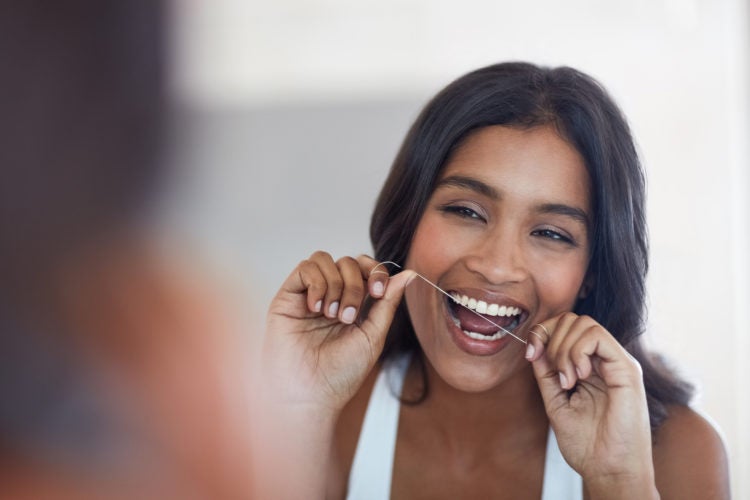-
Invisalign® versus Braces

Are you trying to decide between Invisalign® and braces? The first modern braces were invented early in the 19th century, and since then, there have been great strides in the field of orthodontia. Invisalign® is one of those strides, offering people the opportunity to correct their teeth without the look of traditional braces. Which method is better? The answer depends on many factors, from the severity of your issues to how quickly the teeth need to be shifted. How do you make the decision?
- Invisalign® is more than just invisible aligners. There will also be “attachments” glued onto the teeth, which will be either opaque or tooth-colored and come in a variety of shapes and sizes. If you have crowding, you’ll have to have interproximal reduction (IPR), which is a type of shaving of the teeth. Be prepared for this IPR to remove .1-.5mm or more of your tooth enamel, permanently.
- The Invisalign® aligners are a big draw. Not only are they less noticeable to other people than traditional braces because of their transparency, but they’re also removable, which is convenient. You can remove them to eat your meals or clean your teeth, and it’s much easier to thoroughly brush and floss with the aligners out of your mouth. You will change your aligners every week or two, essentially treating your own misalignment.
- Braces move teeth more quickly than Invisalign®. The fastest way to move teeth is with low, continuous force, providing constant stimulation to the ligaments around the roots of your teeth. This is best accomplished with Nickel-Titanium (N.T) arch wire, especially when it’s a type that’s high-grade and treated in a way that allows them to work continuously in a low force, at body temperature. High-tech, self-litigating braces move the teeth fastest, while at the same time using the least amount of force.
- With traditional braces, you’ll also have pieces glued to your teeth. They’ll either be stainless steel, clear polymer or ceramic, and they’ll serve as connectors for the arch wire that will move your teeth into position. Except in rare circumstances, IPR is not used with traditional braces.
- The big drawback of traditional braces is that they cannot be removed. You won’t be able to take them out to eat or clean your teeth, because they’re glued on with a fluoride-infused resin. Good dental hygiene is vital when you have braces, and you will need to see your hygienist every four to six months for your gum health.
At Park 56 Dental Group, we provide personalized, quality dental care in a spa-like environment. We offer pediatric, prosthodontics, endodontics, oral surgery, Invisalign®, emergency, and sedation dentistry, all at the highest level of treatment. We serve the Midtown, Central Park, Upper East Side, Park Avenue, and all surrounding Manhattan and New York areas, with a patient-centered practice that has hours to fit your schedule. Schedule your complimentary consultation today by contacting us online or calling us at (212) 826-2322.
-
How Sports Drinks Could Be Ruining Your Teeth

Do you rely on sports drinks to keep you hydrated when you’re working out or playing sports? Sports drinks are helpful if you’re working out in extreme heat, for an extended period of time, or when you’re working out after you haven’t eaten for a while. Because of the electrolytes and carbohydrates in sports drinks, they’re very useful in replacing nutrients and providing energy in extreme situations. However, there’s research to indicate that regular consumption of sports drinks can be hazardous to your dental health.
A recent study of elite and professional athletes revealed that many of them have substantial dental problems, regardless of good dental hygiene. This study, published in the British Dental Journal, looked at 352 athletes, with 256 of those athletes on track to compete in the 2016 Rio Olympics. Competing across different types of sports, including swimming, cycling, soccer, rowing, hockey, sailing, and athletics, the participants had an average age of 25 years old. Out of the 352, 344 completed a questionnaire regarding their dental hygiene, sugar consumption, whether they smoked or chewed gum, and when they last saw the dentist. Pertinent findings included:
- Most of the athletes brushed their teeth twice a day and saw their dentists regularly.
- 80 percent of the athletes consumed sports drinks while training or competing.
- 58 percent used energy bars, and 70 percent took gels.
The risk of dental problems seemed to be heightened by the changes in the makeup of the athletes’ saliva during and after intense exercise. Sports drinks, energy bars, and gels are marketed without guidance about oral health. While the researchers acknowledged that their findings were limited, especially because they had to rely on the participants’ honesty about their habits, they still concluded that these products have a negative impact on dental health. The sugar the products contain increases the risk of tooth decay, and the acidity of the products increases the risk of erosion. During the dental check-ups of the athletes, the researchers noted high levels of tooth decay and acid erosion.
What does this mean for the general population? Because dental problems are common, the CDC recommends fluoride toothpaste and fluoridated water, thorough brushing and flossing, and regular dentist visits, abstention from smoking and limited alcohol consumption. We would add that it also might be best to stick with water during most exercise periods, rather than hydrating with sports drinks that may damage your teeth.
At Park 56 Dental Group, we provide personalized, quality dental care in a spa-like environment. We offer pediatric, prosthodontics, endodontics, oral surgery, Invisalign®, emergency, and sedation dentistry, all at the highest level of treatment. We serve the Midtown, Central Park, Upper East Side, Park Avenue, and all surrounding Manhattan and New York areas, with a patient-centered practice that has hours to fit your schedule. Schedule your complimentary consultation today by contacting us online or calling us at (212) 826-2322.
-
Dentists Give Their Tips for Getting Their Own Kids to Brush Their Teeth

You eagerly await the arrival of your children’s first teeth and cheer every little pearly white as it emerges. By the time they’re old enough to take care of their dental hygiene on their own, however, getting them to properly do it can be like, well, pulling teeth. How can you get your kids to brush their teeth? Here, we offer some tips from dentists who have mastered the art of getting their own kids to brush.
- Make brushing a family affair. Establish a routine in which everyone brushes their teeth twice a day, for at least 2 minutes each time. From the time they’re little, let your kids see you brushing because children love to imitate their parents. During tooth brushing time, you can demonstrate good techniques and how much toothpaste to use.
- Get a good look. When the kids are small, stand behind them and get them to look up at you. That way, you can look down into their mouths and see all of their teeth when you help them brush.
- Don’t stop reminding them just because they’re older. As long as they’re home, ask them if they’ve brushed their teeth, and talk to them about good dental hygiene and healthy eating. When they leave home, send them care packages that include new toothbrushes, toothpaste, and floss.
- Give it a sniff. If you suspect your small child hasn’t brushed, ask to smell his or her breath for the scent of toothpaste. When your child is a teenager, teach this trick: sniff the floss. Teens are breath-conscious, so teaching them to floss their teeth and then smell the floss is a good way to help them gauge whether their breath is socially acceptable.
- Never give up on the routine. Those two minutes spent brushing are extremely important, so establish the routine and stick to it. If you need to set a timer or play music for two minutes to get your kids into the groove, do what it takes, and keep on doing it until it’s firmly established as a habit. For many kids, being able to brush their teeth themselves is a big accomplishment, so play up that angle and praise your kids for a job well done when you catch them practicing good dental hygiene.
At Park 56 Dental Group, we provide personalized, quality dental care in a spa-like environment. We offer pediatric, prosthodontics, endodontics, oral surgery, Invisalign®, emergency, and sedation dentistry, all at the highest level of treatment. We serve the Midtown, Central Park, Upper East Side, Park Avenue, and all surrounding Manhattan and New York areas, with a patient-centered practice that has hours to fit your schedule. Schedule your complimentary consultation today by contacting us online or calling us at (212) 826-2322.
-
The Main Reason People Stop Flossing and What You Can Do About It

Do you know how important it is to floss? You probably know that regular flossing is important to your oral hygiene, but do you actually do it? According to a recent survey, 31 percent of respondents admit to starting and then stopping flossing. Why do people stop, when they know it’s a good thing to do? Time seems to be the primary factor in the failure to floss.
Is this “no time” argument a reasonable excuse? Out of the people surveyed, only 13 percent floss their teeth after every meal, and for 36 percent of those flossers, this was not a daily habit. 64 percent of people who quit flossing didn’t report problems with their flossing routines, so issues encountered during flossing are unlikely to be the reason for quitting. Of those who did report problems, gum damage was the primary reason, at 33 percent. Lesser problems included teeth damage, ineffective cleaning, infections, and dental work problems. Few survey respondents, only 14 percent, believed flossing to be ineffective.
This survey was conducted by DentaVox, the survey arm of Dentacoin, which is a global organization. Other studies have also found that time considerations impact their flossing habits. In one survey from the United States, for instance, 55 percent of respondents reported that flossing is too time-consuming for them to do it regularly.
Ultimately, even though the excuse is a common one, it doesn’t hold water. Flossing is important to your dental health, and if you don’t make time for flossing, you’re opening yourself up to gum disease, tooth decay, and possibly expensive dental treatments. Isn’t that enough incentive to find the time?
How can people work flossing into their schedules more easily? Start by committing to flossing just once a day. You can work it into your morning or evening routine, but you can also do it just about anywhere. Any time you’re sitting, whether you’re at your desk or watching television, you can use single-use floss holders easily and effectively. If you tend to forget to floss, you might also consider keeping these floss holders beside your toothbrush, so that your memory will be jogged while you’re brushing your teeth.
At Park 56 Dental Group, we provide personalized, quality dental care in a spa-like environment. We offer pediatric, prosthodontics, endodontics, oral surgery, Invisalign®, emergency, and sedation dentistry, all at the highest level of treatment. We serve the Midtown, Central Park, Upper East Side, Park Avenue, and all surrounding Manhattan and New York areas, with a patient-centered practice that has hours to fit your schedule. Schedule your complimentary consultation today by contacting us online or calling us at (212) 826-2322.
RECENT POSTS
categories
- Uncategorized
- Cosmetic Dentistry
- Veneers
- Healthier Teeth
- Teeth Whitening
- Dental Health
- Video
- Dental Emergencies
- Invisalign
- Dental Implants
- Root Canal
- Sedation Dentistry
- Infographic
- Dental Crowns and Bridges
- Dental Anxiety
- Gum Disease
- COVID-19
- Bad Breath
- New York Dentist
- Cut out sugar
- General Dentistry
- Oral Health
- Oral Cancer
- Dry Mouth
- Gum Health
- Toothache
- Dental Sealants
- Cavities
